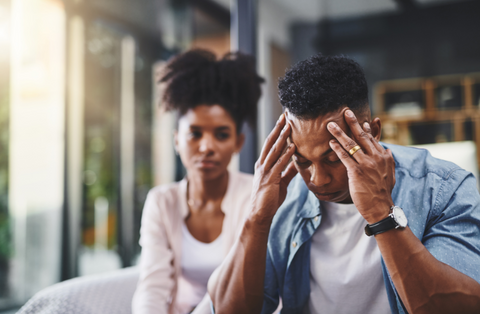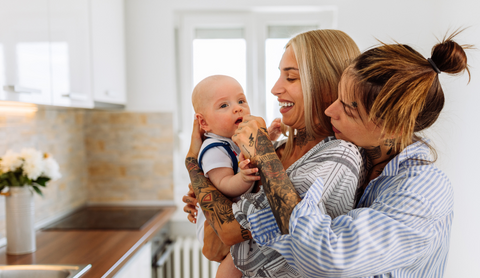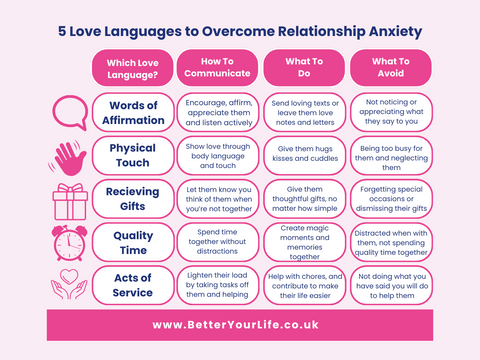What is Relationship Anxiety and How To Overcome It
When we are in a relationship, along with love and excitement, there is another emotion that may also show up unexpectedly, and that emotion is anxiety.
When we are feeling anxious specifically about our relationship, this is known as Relationship Anxiety Disorder.
What is Relationship Anxiety Disorder?
Relationship anxiety disorder is when you are worrying or feeling uneasy or nervous specifically within aspects of your romantic relationship.
If you are at the start of a new relationship, questions like "Is this really my soul mate?” or “Will this relationship last?" may start to show up.
If you are in a long term relationship, you may be questioning if the relationship has run its time, and if you still have the love for each other you once had.

It's a constant feeling of being unsettled in your relationship, where trust in your partner's actions and motives is always in doubt, and communication starts to break down. Trust issues can result in a constant need for reassurance or even a tendency to withdraw emotionally altogether.
If the underlying fear is of abandonment and being left alone, this can manifest in various ways, such as clinginess, possessiveness or withdrawal as a defence mechanism, believing this will protect you from what you are most afraid of. This fear can strain the relationship and even create a self-fulfilling prophecy if not addressed.
What Causes Relationship Anxiety?
Relationship anxiety can result from a variety of ways, including past relationship experiences, personal insecurities or unresolved emotional issues. Understanding the underlying causes is crucial for individuals looking to address and manage this type of anxiety effectively.
It's important to note that relationship anxiety is a common challenge that many individuals face at different stages of their romantic lives. Seeking support from an Anxiety Specialist can provide valuable insights and tools to navigate through these challenges, promoting healthier and more resilient relationships.
How Do I Know If I Have Relationship Anxiety?
To understand if you have relationship anxiety, pay attention to your own behaviour.
Are you:
- Constantly checking in on your partner?
- Questioning if they really love you?
- Constantly trying to please them?
- Picking fights to test them?
- Constantly seeking reassurance from them?
- Overthinking every conversation?
These are all common signs.

For some people, their concerns may be an extension of general anxiety about life, and with 1 in 4 people struggling with an anxiety disorder, it’s a common challenge many couples face.
Relationship anxiety is a never-ending feeling of questioning your relationship and feeling uneasy with your partner. Not trusting your own feelings, and questioning their behaviour.
Despite their efforts to convince you, you are not quite feeling it, and this can lead to behaviours like checking up on them all the time or testing their love for you.
It can also make you self sabotage and pick fights, or overthink and analyse every little thing your partner says or does.
It can seem relentless.
Does Relationship Anxiety Go Away?
I realise it is not the answer you want to hear, but whether relationship anxiety goes away or not varies from person to person.
Sometimes, it fades as trust increases between the two of you in the relationship.
But for others who have had negative experiences and fears from past relationships, and if you continue to carry these experiences into the next relationship, it is, unfortunately, likely to stick around longer.
The main key here is to identify the source of your anxiety.
If it's because of genuine concerns about your partner's actions, and you have evidence to back up your concerns, then you will need to address them.
If it's because of your own past fears, it's a chance for personal growth and to understand why you are not able to trust them.
How Do I Overcome My Relationship Anxiety Disorder?
Dealing with relationship anxiety disorder involves understanding your own behaviour first.
You may need to address this from different angles. Here are some practical steps:
Learn To Be More Compassionate:
Sometimes, your partner may have had a bad day. It may be nothing to do with you, but they seem withdrawn and quiet.
Instead of immediately seeking relief from your anxiety and self doubt, or thinking that you have done something wrong or they don’t love you as much as they did before, take some deep breaths and give them space.
Break the habit of seeking reassurance and learn to sit with your feelings. This is not always easy, but it is essential. You may be tempted to dissect every action or word from your partner, which may lead to you overthinking and to unnecessary stress. Small gestures or throwaway comments can become a source of intense scrutiny, contributing to a heightened state of general anxiety.
The chances are, their behaviour is nothing to do with you, but something else that has happened in their day.
Give them time to work through what they need to do, and try your best not to be needy.
Understand Your Core Beliefs and Values:
Work with a therapist to uncover core beliefs about relationships that have been formed in your past, and get to know the values that you live by.
These beliefs and values might be behind your self-sabotaging behaviours. Working with an anxiety specialist to challenge and change these beliefs can lead to positive transformation both for yourself, and your relationship.
In a recent client session with a couple with relationship anxiety, after we worked out both their values, it was clear that safety and security were very high for her. However, her partner valued fun and spontaneity most of all.
It is clear to see that the way they were living their lives is very different. Once we know each others core values (and more importantly our own) we can start to see things from a different perspective and appreciate why we and our partner behave as we do.
This can be very reassuring as we can learn to not take their actions so personally.
Educate Yourself:
Understand more about anxiety and read books about healthy relationships, like "The 5 Love Languages" by Gary Chapman. Share what you have learnt with your partner to better understand each other.
We tend to show love and affection in the same way we like to receive it, however this is not the same way for everyone and your partner may have a different love language to you.
In a recent client session, Richard was frustrated because he was not feeling loved. He would shower his wife with hugs and kisses and said he was doing everything to make her feel loved. He believed she didn’t show him any love in return. She on the other hand, explained that she felt “smothered” by his love. He was baffled by this!

When we discussed love languages, she was struggling to work out her primary language. She was frustrated because she kept the house clean, cooked him his favourite meals and even turned the heating up just before he came home from work so the house was nice and cosy. She lit candles and went to a lot of effort to ensure everything looked clean and tidy when he returned from work. Richard explained that this was a result of his wife’s OCD, however Angela was confused.
She went to all this trouble to make him feel loved, and she felt underappreciated.
Richards primary love language was physical touch and words of affirmation, whereas Angelas primary love language was acts of service.
Once they could understands their differences, they could appreciate how both were making a lot of effort, but were both being misunderstood!

Communication:
Talk openly with your partner without judgment or blame.
If both of you are willing, consider attending therapy together as this creates a safe space to open up and participate in honest conversations.
However, even if your partner is not willing, you will be able to have a positive input on your relationship by challenging some of your own beliefs and behaviours.
Communication is at the heart of any healthy relationship. However, when anxiety shows up, it can disrupt this flow, leading to misunderstandings, misinterpretations and a sense of emotional distance.
The fear of rejection or abandonment may also prevent you from expressing yourself openly and honestly, and lead to people-pleasing behaviours that are not serving you well.
Individuals experiencing relationship anxiety may also find themselves caught in a cycle of hesitation and overthinking before communicating with their partner.
This can result in a lack of spontaneity, preventing the relationship from growing stronger organically.
Furthermore, the fear of being vulnerable can be a powerful barrier to open communication. If you are struggling with relationship anxiety, you may hesitate to share your true thoughts and feelings, fearing that doing so will expose you to potential rejection or judgment.
Define Your Ideal Relationship:
Keep a clear vision of the loving and trusting relationship you want.
Understanding the type of relationship you really want helps to align your actions with your goals.
Relationship anxiety may add some doubt, but with understanding, communication and taking proactive steps, you can turn it into a stable relationship with lasting joy and connection.
Clearly defining personal boundaries can provide a sense of security. Knowing and respecting each other's limits encourages a healthy balance in the relationship. This involves open dialogue about individual needs and expectations, creating a framework that promotes mutual respect and understanding.
Recognise the patterns, break the cycles, and use this as an opportunity for growth within your relationship.
Client Experience
When a past client contacted me asking if I do couples therapy, I originally said No and referred her to someone I thought was more qualified to help them. After all, my specialist area is anxiety!
However, she insisted on working with me again, as she had a positive experience previously in overcoming her anxiety, so I eventually agreed to see her and her partner to see if I could help them.
She explained that they had been together for 9 years and they had two young children. She knew she loved him but she was being worn down by his lack of trust in her and she was beginning to doubt if he was her soul mate after all.
Communication wasn’t great between them anymore and she didn’t feel as it they could talk to each other without a fight. She told me she was constantly treading on eggshells.
When I met them both, it was clear that he thought the world of her but he was self-sabotaging their relationship and putting his own anxieties about his past relationship onto my client - lets call her Claire - and that was triggering feelings in her too.
They both agreed that they were not communicating like they used to. They also both agreed they wanted to try their best to make their relationship work and get back to the feelings they had when they first met.
Claire had recently started a new job within the fire service, and her partner – lets call him Bob – was suddenly worried about her being surrounded by younger, stronger, better looking men.
As a result, he became more suspicious, and every morning, when she dressed for work, he would question her about the clothes she wore, because he was worried about who she was trying to impress. Every evening, he would want to know about her day, focusing specifically on who she spoke to and why.
It was obvious to me that his behaviour had nothing to do with Claire, or what she wore, it was based on his past relationship. It then came to light that his ex-wife had an affair with a work colleague.
He was bringing his own anxiety – fear of an event that hasn’t yet happened – into his current relationship, and this was making Claire feel unloved because he didn’t trust her.
As soon as it was obvious that anxiety was the underlying cause of all their problems, we were able to address the underlying issue.
I have had many couples referred to me since then, as I now understand that anxiety is the cause of the majority of relationship breakdowns.
For true transparency, not all my clients have decided to stay together, but they were able to make that decision logically – not from a place of fear or anxiety.

If You Need Further Support
Overcoming relationship anxiety is a journey that involves a combination of techniques and strategies.
While you can implement these tools independently, seeking the support of an anxiety therapist provides an additional level of guidance and assistance, and enables you to get to the root cause.
Taking care of your mental health is an essential part of your overall well-being. If left unresolved, anxiety can spiral out of control and have a significant impact on every area of life.
It is my belief that no one needs to struggle with anxiety, we just need the correct strategies and techniques to overcome it.
So if you want to take the next steps to have a happier life where your fears no longer hold you back, click the link below and book a free no obligation consultation call.
Other Resources
Watch some Breathing Techniques to Reduce Anxiety
Watch How To Overcome Anxiety Immediately
Read 5 Simple techniques to ease anxiety
Read How To Have a Supportive Conversation about Mental Health
Read How to Live a Dream Life Where You Are Free to Thrive
Download my worksheet to Take Back Control





